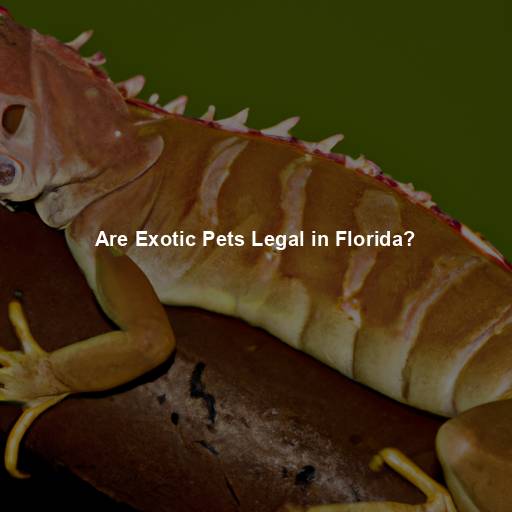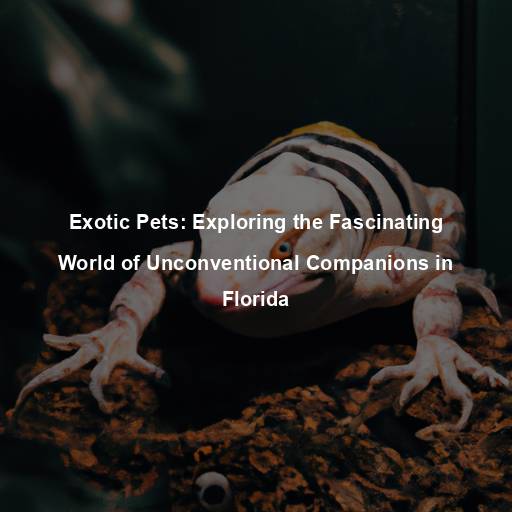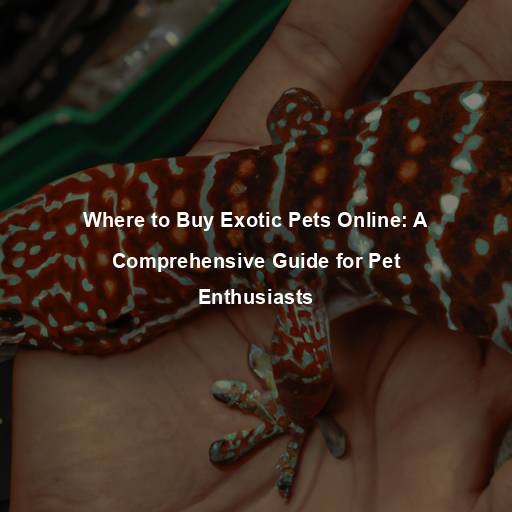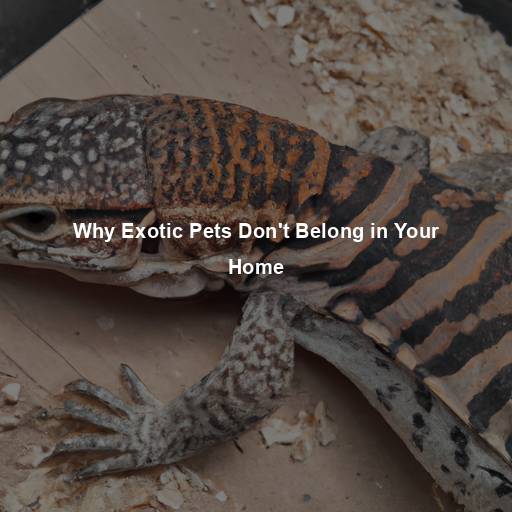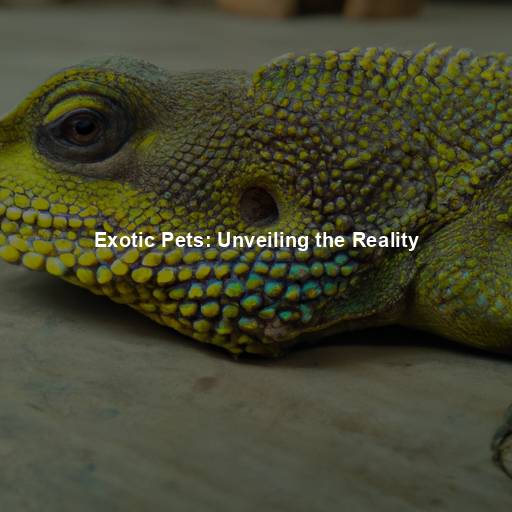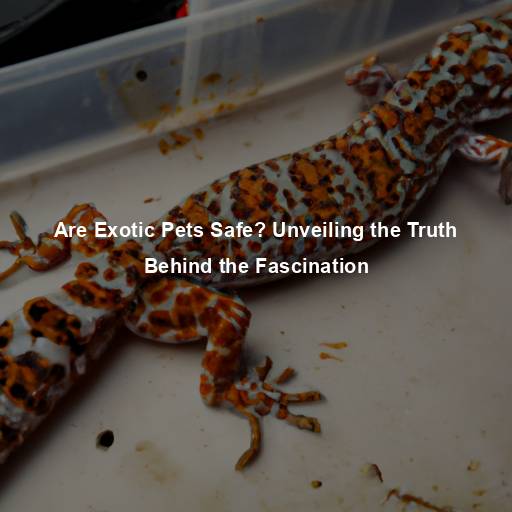Are Exotic Pets Legal in Florida?
Last Updated on July 9, 2023 by Evan
Contents
- 1 Understanding the Legal Landscape of Exotic Pets in Florida
- 1.1 Exploring the Definition of Exotic Pets
- 1.2 Understanding the Florida Wildlife Conservation Commission (FWC)
- 1.3 Permit Requirements for Exotic Pets in Florida
- 1.4 Exotic Pet Ownership Considerations in Florida
- 1.5 Understanding the Impact of the Exotic Pet Trade
- 1.6 Environmental Concerns
- 1.7 Public Safety and Health Risks
- 1.8 Illegal Exotic Pet Trade
- 2 Protecting Florida’s Wildlife: Conservation Efforts and Education
- 3 The Human-Animal Bond: Responsible Pet Ownership
- 4 FAQs: Are Exotic Pets Legal in Florida
- 4.1 What are considered exotic pets in Florida?
- 4.2 Is it legal to own exotic pets in Florida?
- 4.3 What permits or licenses are required to own an exotic pet in Florida?
- 4.4 Can I legally own a big cat or a primate as a pet in Florida?
- 4.5 Are there any specific banned exotic pets in Florida?
- 4.6 Do I need a permit to own a venomous snake as a pet in Florida?
- 4.7 Are there any restrictions on owning non-venomous reptiles as pets in Florida?
- 4.8 Where can I find more information about owning exotic pets in Florida?
Understanding the Legal Landscape of Exotic Pets in Florida
With its abundant fauna and picturesque landscapes, Florida has always been a magnet for animal enthusiasts seeking a taste of the exotic. Yet, the enigmatic question of whether one can legally own these fascinating creatures in the Sunshine State has left many perplexed and intrigued. In this captivating article, we will embark on an adventure into the labyrinthine realm of Florida’s regulations, permits, and the myriad of considerations that arise when one seeks to possess these extraordinary pets. So, fasten your seatbelts and prepare to delve into the thrilling world of owning these remarkable beings in the land of sun and wonder.
Exploring the Definition of Exotic Pets
Before delving into the legalities, it is crucial to establish what exactly constitutes an exotic pet. Generally, exotic pets are non-native species that are not commonly kept as household pets. They can range from reptiles and amphibians to small mammals and even some avian species. The allure of owning an exotic pet often stems from their unique appearance, behavior, or rarity.
Understanding the Florida Wildlife Conservation Commission (FWC)
Florida’s wildlife is safeguarded and overseen by the esteemed Florida Wildlife Conservation Commission (FWC), whose role is paramount in maintaining the delicate balance of nature. The FWC, through its comprehensive framework of guidelines, permits, and restrictions, assumes responsibility for various facets of wildlife management, especially the ownership and possession of exotic animals. Those contemplating the addition of an exotic pet to their family must acquaint themselves with these intricate and vital regulations for the well-being of both the creatures and their human caretakers.
Permit Requirements for Exotic Pets in Florida
In Florida, the ownership of exotic pets is subject to specific permit requirements. The FWC has established different categories based on the level of risk and potential danger posed by various species. These categories include Class I, Class II, and Conditional species.
Class I Species: Prohibited Animals
Some creatures are just too wild and unpredictable to be kept as pets. We’re talking about the Class I species—the kind of animals that can make your heart race and your palms sweat. Lions, tigers, bears… oh my!
Class II Species: Restricted Animals
Owning certain Class II species can be quite the adventure, but it’s not for the faint of heart. From primates swinging through the trees to majestic wolves howling at the moon, and even the mighty crocodiles lurking in the depths, these animals definitely make a statement. However, before you embark on this wild journey, you’ll need to navigate the world of permits and precautions. It’s essential to show not only your passion but also your expertise in handling and caring for these captivating creatures.
Conditional Species: Stricter Regulations
Conditional species, as the name suggests, are subject to stricter regulations than Class II species. These animals, including certain reptiles and monkeys, require a Conditional species permit for ownership. Individuals seeking this permit must meet additional criteria, such as providing proof of experience, secure enclosures, and adherence to specific care standards.
Exotic Pet Ownership Considerations in Florida
While the allure of owning an exotic pet may be strong, it is crucial to consider several factors before venturing into ownership. These considerations include:
Ethical Considerations
Exotic pets often have complex care requirements and specific environmental needs. It is essential to ensure that you can provide a suitable habitat, diet, and enrichment for the animal in question. Additionally, the capture and trade of certain exotic species can have detrimental effects on their populations in the wild.
Financial Responsibility
Owning an exotic pet can be financially demanding. Costs associated with enclosures, food, veterinary care, and potential liability insurance should be carefully considered. Exotic pets may also require specialized veterinary care, which can be both challenging to find and expensive.
Potential Risks and Safety
Exotic pets, especially those classified as Class II or Conditional species, can pose risks to both owners and the public. Such animals may require extensive training and precautions to ensure their safe handling and prevent potential escape or harm. It is crucial to understand the potential risks involved and take necessary steps to mitigate them.
Long-Term Commitment
Exotic pets, like any other pet, require a long-term commitment. Some species can live for several decades, necessitating a lifelong dedication to their care and well-being. Before bringing an exotic pet into your home, consider your ability to provide ongoing care and ensure that you are prepared for the long-term commitment involved.
Understanding the Impact of the Exotic Pet Trade
The captivating allure of the exotic pet trade stretches its tentacles across the globe, encompassing the perplexing world of capturing, breeding, and ultimately selling non-native species as desirable companions. Nestled amidst the vibrant tapestry of Florida’s exceptional ecosystem and teeming with an abundance of wildlife, this idyllic haven has unwittingly transformed into a dazzling hotspot for this bewildering industry. Although a fraction of exotic pets are ethically bred within the confines of captivity, the vast majority are harvested from the untamed wilderness, unearthing disquieting apprehensions about the harrowing repercussions on native populations and the delicate balance of treasured ecosystems.
Environmental Concerns
The introduction of non-native species into Florida’s delicate ecosystem can have severe consequences. These exotic pets, if they escape or are released into the wild, can disrupt the balance of native flora and fauna. Invasive species can outcompete native species for resources, prey upon them, or introduce diseases, leading to the decline or extinction of native species.
Public Safety and Health Risks
Exotic pets, particularly those classified as Class I or Conditional species, can pose significant risks to public safety and health. These animals may have the potential to cause severe injury or transmit diseases. Incidents involving escaped or released exotic pets have occurred, leading to concerns for public safety and the need for stricter regulations.
Illegal Exotic Pet Trade
It’s absolutely mind-boggling how the illegal exotic pet trade just can’t seem to be tamed, even with regulations supposedly in place. These sneaky smugglers and questionable characters have found ways to tiptoe around permit requirements, resulting in the unauthorized possession and sale of species that should be left in their natural habitats. It’s not only a slap in the face to conservation efforts but also a sad continuation of the vicious cycle of animal mistreatment and relentless exploitation.
Protecting Florida’s Wildlife: Conservation Efforts and Education
Conservation Organizations
Flourishing amidst the vibrant ecosystem of Florida, a cohort of tenacious conservation organizations devote their every fiber to safeguarding the indigenous wildlife and fostering the sanctuary of untamed havens. Undeterred by the perplexing complexities of the exotic pet market, these valiant champions stride forth, kindling awareness of its consequential repercussions and steadfastly pressing for stricter governance and more vigilant enforcement. With hearts ablaze, they also extend their embrace to the forlorn creatures ensnared in this rapacious web, engaging in tireless rescue missions and nurturing their road to recovery.
Educational Programs and Outreach
Education plays a crucial role in promoting responsible pet ownership and conservation. Many organizations, including wildlife sanctuaries, zoos, and educational institutions, offer programs and outreach initiatives to educate the public about the risks and responsibilities associated with owning exotic pets. These programs aim to foster a deeper understanding of wildlife conservation and the importance of preserving native ecosystems.
Promoting Ethical Alternatives
Creating a shift in the public’s perception regarding exotic pets requires us to explore ethical alternatives with a fervent urgency. By championing the adoption of pets from compassionate shelters or conscientious breeders, we can gradually diminish the insidious demand for these captivating yet vulnerable species. It is imperative that we lend our voices to the cause, calling for stringent legislation that outlaws the sale of certain exotic animals, fuelling the battle against the illicit trade that engulfs them. Let us embark on a collective journey towards a world where our furry friends are cherished and cherished alone.
The Human-Animal Bond: Responsible Pet Ownership
Considerations for Prospective Exotic Pet Owners
Bringing an exotic pet into your home is an exciting and intriguing decision, but it requires a careful evaluation of various factors that often perplex potential owners. To embark on this journey, dive into a deep pool of research and navigate the intricate details of the species that captures your interest. Uncover their unique characteristics, habits, and needs, and let this burst of knowledge empower your decision-making process.
Research the Species
Explore the intricacies of understanding the unique needs, behaviors, and intricate care requirements of the delightful creatures you may be contemplating as companions. Discover the art of creating a nurturing space that caters to their physical and psychological requirements, ensuring a harmonious and fulfilling existence for both of you. Engage in a journey of discovery that will leave you equipped with the knowledge and empathy to create an environment that truly meets the needs of these remarkable creatures.
Assess Your Abilities and Resources
Evaluate your experience, resources, and commitment to providing proper care for an exotic pet. Consider the financial costs, time commitment, and potential challenges associated with their care.
Seek Expert Advice
Consult with experienced exotic pet owners, veterinarians, or reputable organizations to gather insights and guidance. Learn from their experiences and seek their advice on responsible pet ownership.
Consider Adoption
Why settle for an ordinary companion when you can embark on an extraordinary journey with a rescue animal? By adopting from a trusted rescue organization or sanctuary, you can give a deserving exotic pet the chance they’ve been yearning for – a forever home filled with love and compassion. Step into the realm of the extraordinary by offering a second chance to these unique creatures, and let the perplexity of their stories captivate your heart.
Responsible Ownership and Care
When venturing into the world of exotic pet ownership, it becomes paramount to prioritize responsible stewardship and attentive care. By placing a strong emphasis on these aspects, you ensure the well-being and longevity of your unique companion. Cultivating a deep understanding of your exotic pet’s specific needs, providing a suitable habitat, and investing time in proper education and expert guidance are crucial steps toward fulfilling the role of a responsible owner. Only through a steadfast commitment to these principles can you truly navigate the perplexing yet rewarding journey of exotic pet ownership.
Provide a Suitable Habitat
Create an environment that mimics the natural habitat of the species, ensuring appropriate temperature, lighting, humidity, and enrichment.
Proper Nutrition and Veterinary Care
It is crucial to seek guidance from a knowledgeable exotic pet veterinarian when it comes to your furry friends’ nutrition and overall well-being. These unique animals often have specific dietary requirements that demand careful attention. Additionally, regular health check-ups are crucial to detect any hidden issues and ensure their longevity.
Enrichment and Mental Stimulation
Give your exotic pet a world of excitement and intrigue by indulging them in mind-boggling activities. Treat them to an array of stimulating toys and brain-teasing puzzles that will keep their curious minds occupied. Don’t forget to pump up the adventure quotient by giving them ample opportunities for physical exercise to quench their thirst for action. Let the party of perplexity begin!
Responsible Breeding Practices
Breeding exotic pets demands a solemn commitment to responsible practices, urging individuals to delve into the intricate tapestry of genetic history. A profound comprehension of the ancestry paves the way for the utmost welfare and guarantees an optimal nurturing environment for both parent and offspring. It is vital to embark on this extraordinary journey equipped with the knowledge to secure suitable forever homes for these precious creatures, unraveling the perplexities of ethical breeding with grace and conscientious consideration.
FAQs: Are Exotic Pets Legal in Florida
What are considered exotic pets in Florida?
Welcome to the world of Florida’s fascinating exotic pets! These unique creatures are like nothing you’ve ever seen before, hailing from distant lands and bringing a burst of color and intrigue to the Sunshine State. From slithering serpents to majestic big cats, the list of exotic pets in Florida is as perplexing as it is diverse. So, buckle up and get ready to explore the extraordinary world of non-native treasures that call Florida their new home.
Is it legal to own exotic pets in Florida?
In the sunshine state of Florida, the realm of exotic pets beckons with a sense of adventure. However, amidst this wild landscape, one must navigate through a labyrinth of rules and regulations, carefully crafted by the Florida Fish and Wildlife Conservation Commission (FWC). Their noble purpose? To safeguard the delicate balance of nature, regulate the ownership, breeding, and trade of these charismatic creatures, and protect against the encroachment of non-native species, all while allowing for the occasional taste of the extraordinary. So, harness your curiosity and embark on this perplexing yet exhilarating journey into the realm of exotic pet ownership.
What permits or licenses are required to own an exotic pet in Florida?
Owning an exotic pet in Florida is no ordinary endeavor. The path to legality is as winding and unpredictable as the jungle itself. Before you can proudly call a distinctive creature your own, you must navigate the enigmatic world of permits. From Class I to Class III, each level brings with it a peculiar set of rules and guidelines, tailored to the idiosyncrasies of the species you desire.
Can I legally own a big cat or a primate as a pet in Florida?
If you’ve ever dreamt of having a majestic big cat or an intelligent primate as a pet, consider Florida as an option. However, don’t get too excited just yet, as it’s no walk in the park. The state has strict regulations in place to ensure the safety and well-being of these extraordinary creatures, such as obtaining a Class I permit from the FWC (Florida Fish and Wildlife Conservation Commission). This process won’t be a piece of cake since it requires you to prove your experience and expertise in handling and caring for these magnificent animals, while also meeting stringent criteria. And even if you do manage to jump through all the hoops, be prepared to adhere to strict housing, safety, and security standards. Intriguing, isn’t it?
Are there any specific banned exotic pets in Florida?
Yes, there are certain species of exotic pets that are banned outright in Florida due to their potential danger to humans, the environment, or native wildlife. This includes but is not limited to chimpanzees, gorillas, orangutans, elephants, hyenas, wolves, crocodiles, and several venomous snakes. It is important to consult the FWC’s prohibited species list to ensure compliance with the regulations.
Do I need a permit to own a venomous snake as a pet in Florida?
Owning a venomous snake as a pet in the Sunshine State of Florida is no simple feat. Those who desire such an enigmatic companion must first obtain a venomous reptile license. This license comes with a host of rigorous regulations, demanding utmost diligence in ensuring secure enclosures, meticulous labeling, and stringent reporting measures. It is not just the owner’s welfare that is at stake, but the safety of the public as well, making this a matter of paramount importance.
Are there any restrictions on owning non-venomous reptiles as pets in Florida?
Owning non-venomous reptiles in Florida as pets can be quite a fascinating adventure! The best part is, you don’t need a permit, as long as they are not on the prohibited species list. But remember, responsibility is key – ensuring their well-being through appropriate care, proper housing, and secure containment, while considering their unique attributes, such as size, behavior, and environmental requirements. So, if you’re ready to dive into the world of owning these scaly wonders, just don’t forget to be a mindful and conscientious reptile guardian!
Where can I find more information about owning exotic pets in Florida?
For more detailed information, it is best to visit the official website of the Florida Fish and Wildlife Conservation Commission (FWC) or contact their office directly. They provide comprehensive guidelines, permit applications, and specific requirements for owning exotic pets in the state. Additionally, local authorities and experienced exotic pet owners can also provide valuable insights and guidance.

